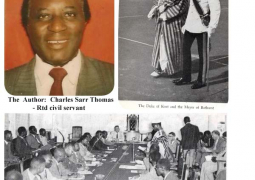We
should first of all recognise that the Barrow Government has started taking
steps of reformation to usher in a befitting new dispensation.
However,
politicians are in most cases not the same when they are wearing the robe of
opposition and when they are in their robe in the corridors of power.
They
many a time show their true colours when in government or when they are
wielding state power - words are hardly translated into actions.
On
the journey to State House by the Coalition, many promises or planned policies
have been delivered on the podium of campaigning for state power and, as the
Fourth Estate, we will not relent in our role of reminding and calling on the
powers that be to do that which is expected of them – that is, putting in place
sound and correct policies and taking right actions that will bring about real
transformation and development in our country.
In
that drive, freedom of association, press freedom, human rights and
socio-economic development must be seen to be realised.
Such
a call has just been re-echoed by institutions such as Article 19 and Media
Foundation for West Africa (MFWA).
In
its clear and simple message, Article 19 calls on or reminds the new President
to “deliver on inclusion and prioritise free expression”.
It
states: “Gambia has voted for change, and we hope to see President Barrow
deliver on promises to build a society committed to transparency, public
participation and media freedom.
“It
is essential that freedom of expression and information are safeguarded in the
new Gambia and we want to see the President engage with civil society and
ordinary Gambians throughout the transition process. It is time for all Gambians to have a voice.”
The
new government will, therefore, do well to prioritise reforming or repealing
laws used to stifle free expression, specifically the Information and
Communications Act, the Newspaper Act and the amended Criminal Code, which
increases sanctions on sedition, libel, public disorder, and false information.
Under
the new Attorney General and Minister of Justice, it is hoped this will be done
without much ado. Experience has shown that when these things are delayed, it
becomes difficult for the sitting governments to give the media that free space
to do their job well and professionally.
That
is why organisations like Media Foundation for West Africa (MFWA) would
continue to call on state authorities to put things aright, especially as
regards free expression, press freedom and human rights issues.
At
their latest meeting (25 and 26 January 2017) in Dakar, Senegal, the MFWA board
directors made a loud and clear call on the new Gambian government to respect
the rights of the people and the media.
They
called on the new government to be mindful of the “very repressive press
situation and freedom of expression conditions in The Gambia under the 22-year
rule of President Yahya Jammeh”.
The
government would, therefore, do well to undertake “urgent reforms that will
promote, protect and defend the rights of the Gambian people to freely express
themselves and to guarantee press freedom in the country.
“Such reforms will include the repeal of laws
that criminalise speech offences and the passage of a Right to Information
(RTI) legislation,” the MFWA stated in a resolution.
It
urged the new government to support media sector reform measures such as
“building the capacity of journalists, improving journalism training
institutions, strengthening and reforming the Gambian Television and Radio
Service (GRTS), and other initiations that will ensure a vibrant, pluralistic and
professional media landscape that will support participatory and accountable
governance”.
These
are genuine and fundamental steps that need urgent government action. We hope
and pray that the new government lives by its word.
“
People demand freedom of speech as a compensation for the freedom of thought
which they seldom use.”
Soren
Kierkegaard


